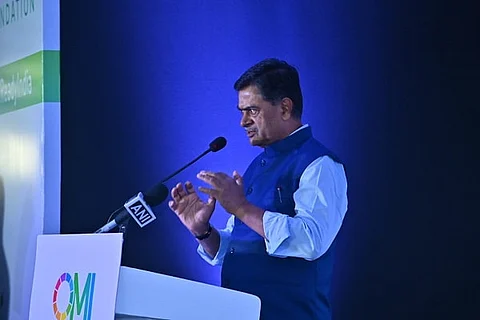

New Delhi: The government will bring out another production-linked incentive (PLI) scheme for batteries to bring down the cost and boost the adoption of electric vehicles in India, Union Minister for Power and Renewable Energy RK Singh said on Monday. Speaking at the EV (electric vehicles) Ready India Dashboard of OMI Foundation, the Union Power and New & Renewable Energy Minister said, "We are coming out with another production-linked incentive (PLI) to increase the volumes (of storage or battery)."
He was of the view that the price of storage will come down with (higher) volumes. "Price of storage will come down only if you add volumes. That is why there is a production-linked incentive (PLI) for storage," he said.
He pointed towards limited battery manufacturing capacity in the world and termed it as a reason for high prices. The minister opined that higher cost and lower driving range are issues in adopting EVs.
The Central government had approved the PLI scheme for manufacturing advanced chemistry cell (ACC) batteries at an estimated outlay of Rs 18,100 crore in May 2021, with an objective to attract foreign and domestic investment of Rs 45,000 crore. The scheme was aimed at achieving the manufacturing of 50 GW of battery storage.
The ACCs are the new generation of advanced storage technologies that can store electric energy either as electrochemical or as chemical energy and convert it back to electric energy as and when required.
"For us, as a country, switching to electric mobility is of absolute importance. One rider to emerge as a power (economy), is that you cannot be energy dependent. That is our primary reason to push towards EV," the minister said. Singh pointed out that the transition to EVs will reduce emissions in India.
He stated that 80 percent of lithium resources are tied up by one country and 88 percent of processing of lithium is also in one country. He added, "We are lucky that we have some lithium reserves in Jammu." He suggested the need to shift away from lithium to other chemistry (of batteries).
"The research is going on in sodium ions. If that works fine. Alternative chemistry is absolutely essential. Once you have alternative chemistry, you have security of the supply chain (of storage). Supply chain issues are strategic issues," he said.
Singh also pointed towards high power demand of 16 percent in the first fortnight of October. "My power demand is growing hugely. In August the (power) demand grew at 20 percent as compared to August last year. In September it again grew at 20 percent. In October, the past fourteen days, it has grown by about 16 percent," he said.
He also stated that the Indian economy is the fastest-growing large economy in the world and will continue to be so in the next two or three decades. "Last year we grew at 7.3 percent. This year we are growing at 6.3 percent and my assessment is that we will continue growing at 7.5 to 7.8 percent. So the rate of growth will increase and will not plateau," he said.
India's installed power generation capacity is 425 GW and it will grow to 800GW by 2030 because my (India's) demand is going to double by 2030, the minister informed. The minister also said that India's non-fossil fuel-based installed power generation capacity is 185 GW which is 43 percent to the total (425 GW).
He stressed that by 2030, India shall have 65 percent of our capacity coming from non-fossil fuel-based power. "We have pledged that by 2030, we will reduce our emission intensity by 45 percent. We will cross that (achievement) as well," he said.
